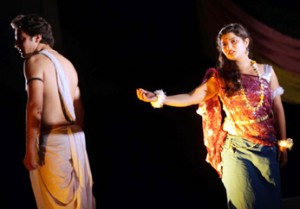Excelsior Correspondent

JAMMU, Apr 28: Shivani Cultural Society staged Rabindranath Tagore’s famous play ‘Chitra’, as the fifth presentation in the J&K Cultural Academy’s ongoing Tagore Theatre Festival, at the Government Women College, here today.
The source of the play is Mahabharata- an episode from Arjuna’s life during his exile. Princess Chitrangda, King Chitravahana’s heir, who has been raised like a son seeks help from gods Madana and Vasanta to make her attractive for a single day as she has lost her heart to Arjuna. The gods are more than generous and endow her with great beauty and charm for a year. The awestruck Arjuna falls in love and breaks his 12-year-old celibacy vow.
Chitra feels guilty for lying to her beloved. When Arjuna hears about Chitra’s fame as fearless lady of great valour and protector of the land, his curiosity is aroused. Hew ends up discussing the ‘other woman’ with her lover only to know that Chitra is the same person he has been living with.
The play aimed at reminding man that the ultimate truth is to be found not at the physical level but in the steady evolution of the self. Chitra is thus established as works of self-discovery.
The play was translated and directed by Vikram Sharma and conceptual designing and creative modulations done by Himanshu Darshan, was a successful presentation in which main characters of Chitra and Arjuna were successfully performed by Neha Lahotra and Rohitashiv Sharma.
Neha Lakhotra through a combination of ‘angika’ and ‘vak abhinaya’, was able to bring subtle emotional nuances and variations while delivering lengthy dialogues that had a visible stress on ethics than on aesthetics. She was able to bring out the shades of the narrative that moves on the inner rather than the outer level of the action. Rohitshiv Sharma’s athletic lithe body with stately movements, very well suited the role of Arjuna.
Other members of the cast included Hardeep Singh as Vasanta, Neeru Bhardwaj as villager one and Vikram Sharma as Nagrik two.
The appropriate costumes of the three main characters in the classical Indian style, and thoughtful light design greatly helped in overall success of the production.

